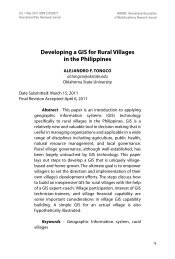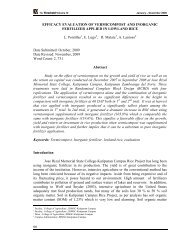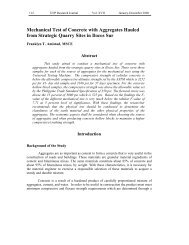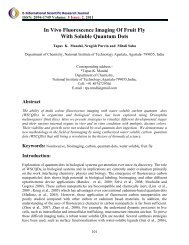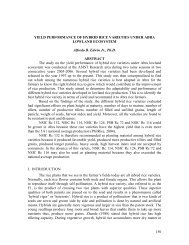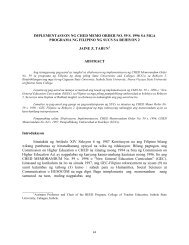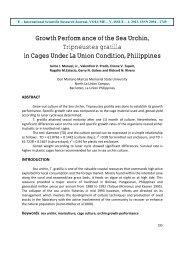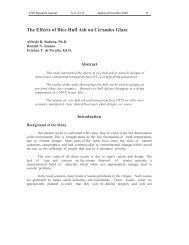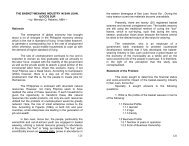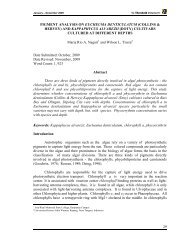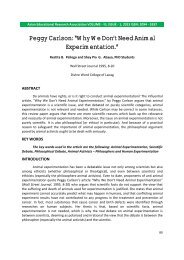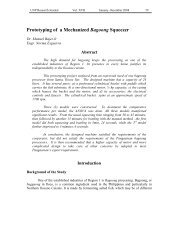download the full article here - EISRJC
download the full article here - EISRJC
download the full article here - EISRJC
You also want an ePaper? Increase the reach of your titles
YUMPU automatically turns print PDFs into web optimized ePapers that Google loves.
E-International Scientific Research JournalISSN: 2094-1749 Volume: 2 Issue: 4, 2010Food preparation and preservation. Since almost all of <strong>the</strong> respondents have norefrigerators, <strong>the</strong>y only used salt, sunlight and concentrated vinegar in <strong>the</strong> preservation offoods. They usually prepared salted fish (tinabal) and dried fish (bulad). Most of <strong>the</strong> time, <strong>the</strong>ycooked <strong>the</strong> fish with concentrated vinegar (paksiw) and <strong>the</strong> meat (adobo). This is <strong>the</strong>traditional way of food preservation practiced during <strong>the</strong> absence of electricity.Garbage disposed at <strong>the</strong> back of <strong>the</strong> houseAccessibility to Health Facilities and Health PersonnelComport rooms. Among <strong>the</strong> 160 Subanen respondents, sixty one of <strong>the</strong>m used a simpleclosed pit comport room; twenty six percent had water sealed and thirteen percent had none. Itwas noted that <strong>the</strong> simple closed pit comport rooms are unsanitary since <strong>the</strong>y are not well –constructed. Some were provided with toilet bowls by <strong>the</strong> Department of Health as part of itssanitary program. In o<strong>the</strong>r municipalities, <strong>the</strong> residents were asked to pay P50 for <strong>the</strong> bowl todefray expense. But only very few had availed of it. They said <strong>the</strong>y cannot afford to pay <strong>the</strong>bowl even at P50.00.To motivate <strong>the</strong> Subanen to construct a comport room and to maintain <strong>the</strong> cleanlinessof <strong>the</strong>ir surrounding, <strong>the</strong> Department of Health through its Midwives with <strong>the</strong> cooperation of<strong>the</strong> local government, gave rewards to <strong>the</strong> households that maintained cleanliness. When <strong>the</strong>rewere unannounced inspections, <strong>the</strong> health workers were surprised because of very cleancomport rooms. It turned out that <strong>the</strong>se were for inspection only. Most of <strong>the</strong>m still defecate in<strong>the</strong> open field usually at <strong>the</strong> back of <strong>the</strong>ir houses. According to a midwife of Sigayan, Dapitan“Almost all <strong>the</strong> time, she reprimanded <strong>the</strong>se people especially <strong>the</strong> children to use <strong>the</strong> comportrooms but <strong>the</strong>y can hardly understand”. Most of <strong>the</strong> respondents said, <strong>the</strong>y can hardly use <strong>the</strong>comfort rooms because <strong>the</strong>y are far from <strong>the</strong> source of water. Majority of <strong>the</strong> thirteen percentwho have no comfort rooms were residing at <strong>the</strong> hilly areas and far from <strong>the</strong> poblacionbarangays.351



